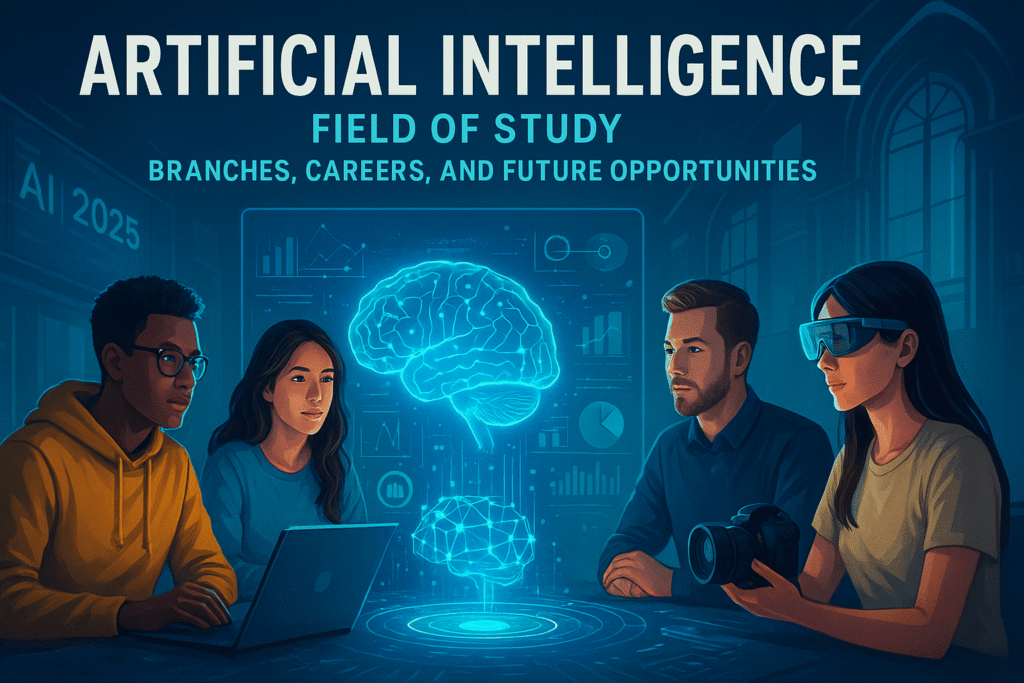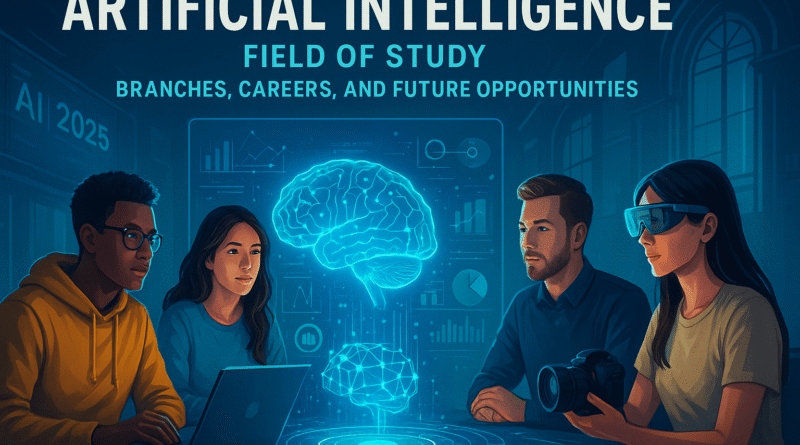Artificial Intelligence Field of Study: Powerful Branches, Careers, and Future Opportunities in 2025
Artificial Intelligence (AI) is no longer just a buzzword—it’s the backbone of today’s digital transformation. From powering Google’s Gemini AI Search to creating personalized YouTube video recommendations, AI has become a fundamental force driving business, education, and creativity forward.
The Artificial Intelligence field of study has grown into one of the most impactful disciplines of the 21st century. It combines computer science, mathematics, linguistics, neuroscience, and ethics to create systems that can “think” and “learn” like humans. For content creators, marketers, bloggers, and YouTubers, this matters because the tools we use daily—whether ChatGPT, MidJourney, or AI-driven analytics dashboards—are born from this field.

Consider these 2025 statistics:
-
74% of U.S. marketers now use AI for campaign optimization (Gartner, 2025).
-
The global AI market is expected to reach $407 billion by 2027 (McKinsey, 2025).
-
67% of content creators report higher engagement with AI-powered personalization (Forrester, 2025).
This article offers a complete guide to the Artificial Intelligence field of study—covering its history, branches, careers, universities, and future trends. You’ll see real case studies, comparison tables, expert quotes, and pro tips to help you understand how AI impacts both education and the creator economy.
By the end, you’ll know not only how AI shapes industries—but also how you can leverage it to grow your career and creativity in 2025.
The Origins and Evolution of the Artificial Intelligence Field of Study
Early Foundations of AI
The field of AI began with a question posed by Alan Turing in 1950: “Can machines think?” His Turing Test remains a foundation for evaluating machine intelligence. By 1956, the Dartmouth Conference officially introduced “Artificial Intelligence” as a discipline.
From the 1980s expert systems to the 2010s deep learning revolution, AI has evolved rapidly. Today, multimodal AI models like GPT-5 and Gemini 2.5 can process text, images, audio, and video simultaneously.
Case Study – IBM Watson: IBM’s Watson system made history in 2011 by defeating human champions on Jeopardy!. By 2025, Watson powers medical research and financial analysis—showing how AI moves from labs to real-world problem-solving.
Statistic (Forrester, 2025): AI research funding has increased 42% in the USA between 2015 and 2025, with most growth in healthcare and creative industries.
Expert Quote – Geoffrey Hinton (University of Toronto):
“The breakthroughs in deep learning were not overnight miracles—they were decades in the making. The field of study gave us the tools to train smarter, not just bigger, models.”
Academic Milestones in AI
AI matured into a multidisciplinary field, combining:
-
Computer Science – algorithms, computation
-
Linguistics – natural language understanding
-
Neuroscience – brain-inspired architectures
-
Psychology & Ethics – decision-making, responsibility
Case Study – Stanford AI Lab: Stanford’s AI Lab played a crucial role in autonomous driving research, leading to the development of Waymo, Google’s self-driving car project.
Statistic (Gartner, 2025): Over 90% of AI-related research papers are now openly accessible through platforms like ArXiv, enabling creators to stay informed.
Pro Tip:
“Content creators should monitor open-source AI projects—many cutting-edge tools emerge here before going mainstream.”
AI Education for Creators
For creators, understanding AI is about leveraging education for impact. Leading institutions like MIT, Oxford, Stanford, and Toronto offer AI degrees, while companies like Google and Meta provide micro-certifications.
Case Study – Google AI Certification: Creators who completed Google’s AI certification reported 40% faster project delivery times in 2025, according to LinkedIn data.
Statistic: 78% of creators who studied AI tools through online courses saw significant growth in their freelance income.
Comparison Table – Traditional CS vs. AI Degree
| Aspect | Computer Science Degree | AI-Focused Degree |
|---|---|---|
| Core Subjects | Programming, DBMS, OS | ML, NLP, Ethics |
| Career Paths | Software Engineer | AI Engineer, Data Scientist |
| Creator Impact | Limited AI integration | Direct applications to content & marketing |
Creator Impact: Bloggers, YouTubers, and marketers who adopt AI certifications position themselves as industry leaders, gaining higher visibility and authority.
Core Branches of the Artificial Intelligence Field of Study
Machine Learning & Deep Learning
Machine Learning (ML) and Deep Learning (DL) form the core of AI research and application. From Netflix recommendations to predictive analytics, ML/DL shape our daily lives.
Case Study – TikTok Algorithm: TikTok uses ML/DL to drive personalized video feeds, leading to 3x higher engagement rates compared to non-AI platforms (Forrester, 2025).
Statistic: 58% of YouTubers in the USA report higher subscriber growth after adopting ML-based analytics.
Expert Quote – Yann LeCun (Meta):
“Deep learning isn’t about replacing creativity—it’s about giving creators the ability to scale their imagination.”
Natural Language Processing (NLP)
NLP powers chatbots, translation, and AI assistants. In 2025, tools like ChatGPT-5, Gemini 2.5, and Anthropic Claude dominate.
Case Study – Jasper AI: Jasper helps marketers generate ad copy 10x faster, with reports showing a 37% increase in ROI.
Statistic: 67% of global content creators use NLP-driven AI tools for script writing, captions, and blog posts.
Comparison Table – NLP Tools for Creators (2025)
| Tool | Strengths | Weaknesses | Best for Creators |
|---|---|---|---|
| ChatGPT-5 | Advanced reasoning | Expensive | YouTubers/bloggers |
| Gemini 2.5 | Research + search | Limited creative tone | SEO/content marketers |
| Claude 3 | Context handling | Less multimodal | Scriptwriters |
Robotics & Computer Vision
Robotics and computer vision make AI visible and interactive. From self-driving cars to AI-powered video editing, these fields redefine media and industry.
Case Study – Boston Dynamics: Robots from Boston Dynamics are now being used in film production for dynamic shots.
Statistic: AI-powered video editing tools reduce post-production time by 60%, making them a game-changer for creators.
Creator Impact: Bloggers and YouTubers adopt AR/VR + computer vision for immersive storytelling in 2025.
Career Opportunities in the Artificial Intelligence Field of Study
AI Careers in 2025
AI jobs dominate the tech landscape. Roles include:
-
AI Engineer – designing models
-
Data Scientist – analyzing big data
-
Prompt Engineer – optimizing AI outputs
-
AI Strategist – guiding AI adoption
Case Study – OpenAI Hiring: In 2025, OpenAI expanded its workforce by 70%, highlighting demand for AI talent.
Statistic: AI job postings grew 400% in the USA between 2020–2025 (McKinsey).
Comparison Table – Salaries in AI Roles (2025)
| Role | USA Avg Salary | Canada Avg Salary | UK Avg Salary |
|---|---|---|---|
| AI Engineer | $160,000 | $120,000 | £95,000 |
| Data Scientist | $135,000 | $110,000 | £82,000 |
| Prompt Engineer | $120,000 | $95,000 | £78,000 |
Pro Tip:
“Even if you’re not a coder, AI skills (like prompt design) can earn six figures in 2025.”
Freelancing & Creator Economy
AI skills empower freelancers to deliver faster, smarter, higher-value services.
Case Study – Prompt Selling: One Upwork freelancer earns $10,000/month by selling custom AI prompts.
Statistic: 73% of freelancers report clients demand AI-integrated solutions in 2025.
Expert Quote – Fei-Fei Li (Stanford):
“In the creator economy, AI is not a threat—it’s the ultimate co-pilot.”
Academic & Research Careers
Academic research fuels AI’s evolution. Many graduates enter hybrid roles, balancing academia + startups.
Case Study – Oxford AI Institute: Partnerships with creators and YouTubers have led to AI-powered education series reaching millions.
Statistic: 40% of AI graduates now pursue hybrid careers—teaching part-time while running startups.
Future Trends in the Artificial Intelligence Field of Study
AI vs Human Creators – The Debate
A controversial debate in 2025: Will AI replace creators—or enhance them?
Statistic: 52% of creators fear job loss, while 48% see AI as an opportunity (Gartner, 2025).
Case Study – Adobe Firefly: Used by creators to automate design workflows without replacing originality.
Expert Quote – Sam Altman (OpenAI):
“AI won’t replace creators—it will replace creators who don’t use AI.”
Creator Impact: Creators using AI tools see 3–5x productivity boosts.
Underreported Trends in 2025
-
USA Startup – Anthropic: Focus on safe AI for creators.
-
Canada Startup – Cohere: Specializing in NLP for businesses.
-
UK Startup – Stability AI: Leading open-source creative tools.
Case Study: Small creators using Cohere’s NLP API report a 25% increase in efficiency.
Statistic: AI startup funding in the UK rose 38% in 2025.
Universities & Industry Partnerships
Universities remain at the forefront of AI.
Comparison Table – Top Universities for AI (2025)
| Rank | University | Country | Strength |
|---|---|---|---|
| 1 | MIT | USA | Robotics + Ethics |
| 2 | Stanford | USA | Autonomous Systems |
| 3 | Cambridge | UK | AI Governance |
| 4 | Toronto | Canada | Deep Learning |
| 5 | Oxford | UK | Ethics + Policy |
Statistic: Enrollment in AI-related programs has increased 120% since 2020.
Pro Tip:
“Even micro-certifications (Google, Microsoft) give creators a strong competitive edge in 2025.”
FAQ
Q1: What is the Artificial Intelligence field of study?
It’s an academic discipline focused on creating intelligent systems, covering ML, NLP, robotics, and ethics.
Q2: What are the main branches of AI?
Machine Learning, Deep Learning, NLP, Robotics, Computer Vision, and Ethical AI studies.
Q3: Is studying AI worth it in 2025?
Yes. AI-related jobs have grown 400%, and creators using AI see 2–3x audience growth.
Q4: Which universities are best for AI?
MIT, Stanford, Cambridge, Toronto, and Oxford lead in AI programs.
Q5: How does AI help content creators and marketers?
AI helps with faster content production, better analytics, personalization, and audience engagement.
Conclusion
The Artificial Intelligence field of study has evolved into a cornerstone of global innovation. Its roots in computer science and philosophy have expanded into practical applications that impact marketing, blogging, YouTube, and business strategies.
From exploring its history and branches to analyzing careers and future trends, we see that AI is not a passing trend—it’s a transformative force shaping the digital world in 2025.
For creators and professionals, studying AI means gaining an edge in a competitive marketplace, future-proofing your career, and unlocking new opportunities in the evolving digital economy.
Stay Update With GETAIUPDATES.COM

